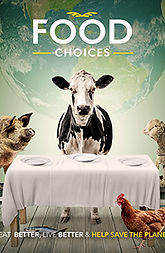
Totally GRODY
Author | Screenwriter | Film Editor | Linguist | Vegan
Certified Holistic Nutrition Practitioner
Certified NLP Practitioner

NUTRITION
One man's food is another man's poison
In pursuit of the ultimate nutritional truth, I've studied many diets over the years. Most of them claim to be the right diet for everyone, and more often than not, they directly oppose each other.
One says eat grains and avoid meat at all costs. The next one says eat meat and avoid grains at all costs. One says a high-carb, low-fat diet is best. Another says a high-fat, low-carb diet is best. One says a high-protein diet is the way to go. Still another says an all-fruit diet is best! It's no wonder we're so confused! And, they can't all be right. Right?
Or, can they? Well, here's a thought. Maybe not everyone should eat the same foods or do the same exercise. Which would explain why a program like the Atkins Diet or Paleo Diet might work for your friend but not for you. Or, why a raw vegan diet works for you, but not for your great aunt Lucy, who's ready to gnaw her arm off from hunger.
Consider this:
Every creature on this earth is designed to eat specific foods, and they instinctively crave those foods. When they eat the right diet for them, they thrive, and the balance of nature stays intact. When they don't, they often become overweight or sickly, and nature falls out of balance.

When it comes to diet, ONE SIZE definitely does not fit all!
Think about it. Have you ever seen a wolf hunt down a watermelon? Or a giraffe eat a steak? Or a penguin eat a dung beetle? That would just be downright craaaazy! Right? And, it would be against their nature.
Well, that same principle applies to us humans, even though we think we can eat everything on the planet! We humans instinctively recognize what is food and what is not. Well, except for those guys on Fear Factor who make people eat live bugs and pig uteruses, ew! They clearly missed the memo!
But, I digress...
Even though we humans all eat the same basic foods, there are differences in what our individual bodies require to be healthy and to function with optimum efficiency. Why?
Because we are as unique on the inside as we are on the outside, and our individual bodies have a genetic requirement to eat specific foods - those that our ancestors ate. If we eat a diet right for our unique body, we thrive. If we eat a diet right for someone else's body, we can gain weight and even get sick.
Well, that's great, Laura, but how am I supposed to know what my body wants? Or, what my great, great, great, great, great Uncle Earl was eating??
Maybe the key is in your genetic code, which we can decipher by looking at your Metabolic Type.





YOUR
METABOLIC TYPE
Metabolic Profiling is a nutritional science dating back to the 1930's and determines our genetic nutritional requirements by decoding our body language. According to William Wolcott, author of The Metabolic Typing Diet, the body communicates its needs through mental, physical, emotional, and behavioral characteristics, and the way we metabolize food into cellular energy is what establishes those characteristics. When we give the body the right mix of proteins, carbohydrates, and fats, it is happy, and we are healthy. When we give it the wrong mix, we've got trouble in River City, and we're gonna hear about it from the body in the form of weight gain, fatigue, illness, digestive problems... All the fun stuff.
So, what is this "right mix" that seems to ever-elude us? This is where that "one size fits all" method of dieting does not work. Because we are all unique on a biochemical level, we all burn food and create cellular energy differently - some do it slowly and others more quickly. Some need more protein to feel energized, maintain an ideal weight, and achieve optimal health, while others need more vegetable carbohydrates. Different foods produce different biochemical reactions in the body depending on your genetic type. This is why foods that work well for your aunt Lucy may actually cause weight gain or health problems for you. So, if your goal is optimal health and wellness and an ideal weight, it is important to find out your metabolic type and give it the corresponding right mix of fuel.
Here's an overview of the three main metabolic types - Protein, Carbohydrate, Mixed:
Protein - Functions best on a high-protein/high-fat/low-carb diet.
Protein Types oxidize carbohydrates too quickly. This means that instead of being converted into energy, almost all carbohydrates consumed are stored as fat. In other words, that plate of pasta goes straight to the hips! Fat storage was a superb genetic feature back in the hunter-gatherer days when you never knew when you were going to eat again. You could live off of the fat of the land, so to speak, until the next kill. Nowadays, this feature can lead to a fun problem known as weight gain. Protein types tend to think about food a lot, always planning the next meal. They also have the strongest appetetites and the biggest aversion to exercise, which can be a bad combination since they tend to have high rates of obesity, diabetes, and heart disease. For all these reasons, Protein types have to really watch what they eat, and do well on a high-protein/high-fat/low-carb diet. Emotionally speaking, Protein Types are friendly, intuitive, and patient. Physically speaking, they tend to be shorter and wider, with a round face and skull. They tend to need lots of sleep and they look younger than they really are.
Carbohydrate - Functions best on a low-protein, high-fruit/vegetable carbohydrate diet.
In contrast to Protein Types, Carabohydrate Types oxidize carbohydrates too slowly. This means that the carbohydrates they consume give them a steady supply of energy throughout the day. This also means they have a hard time gaining weight because their bodies don't do well storing food as fat. Yes, they're the ones who can eat all those high-glycemic foods like cookies, pastries, pasta, bread - a.k.a. the "bad carbs" - and not gain an ounce of weight! They must've been in the back of the line when the fat storage gene was being handed out! Because of this ability to use food as fuel so efficiently, they tend to have low appetites and can even forget to eat. (Forget to eat?!) Carbohydrate types do well on a diet low in protein and high in good fruit and vegetable carbohydrates. Digesting protein and is too difficult and makes them feel sluggish because it takes up a ton of energy to do so. Physically speaking, they tend to be tall and slim with more angular features. They have a lot of energy and stamina and need lots of exercise to feel good. Emotionally, they are high-spirited, highly-motivated, aggressive, focused, intellectual, analytical, left-brained, and can be introverted. High blood pressure and hypertension are common. They also tend to look older than their age.
Mixed - Functions best on a balanced amount of proteins, fats, and carbohydrates.
Mixed Types make up the majority of the average healthy population and contain characteristics of both the Protein and Carbo types. They are the most balanced of all metabolic types and can consume a wide variety of foods without too much trouble. In other words, your basic human garbage disposal. Gluten, however, can be a problem for mixed types as it can lead to allergies, digestive problems, yeast overgrowth, and Celiac disease. Physically speaking, they are balanced in every way, with average weight and shape, average energy, metabolism, and stamina, and normal blood sugar. Emotionally, they are split down the middle as well, being pretty friendly, patient, creative, and analytical, and they tend to look their age.
For more info on Metabolic Typing, visit Mr. Wolcott's website at www.metabolictypingdiet.com
MY FAVORITE
BOOKS

Over the years, I've read a lot of books on diet. A lot...! The ones below are my absolute favorites because they are the ones that have made the most sense to me and the ones that inspired me to become a holistic nutrition coach. Check them out as they call to you. You'll find they contain some very eye-opening information!
MY FAVORITE
DOCUMENTARIES

I've also discovered some really great documentaries. Some of them are about finding the right diet. Others are pretty controversial and cover subjects about our food supply, pesticides, GMOs, fast food, vaccines, Big Pharma, sustainability, and alternative methods for healing diseases like diabetes, cancer and heart disease. Check them out as they call to you.












